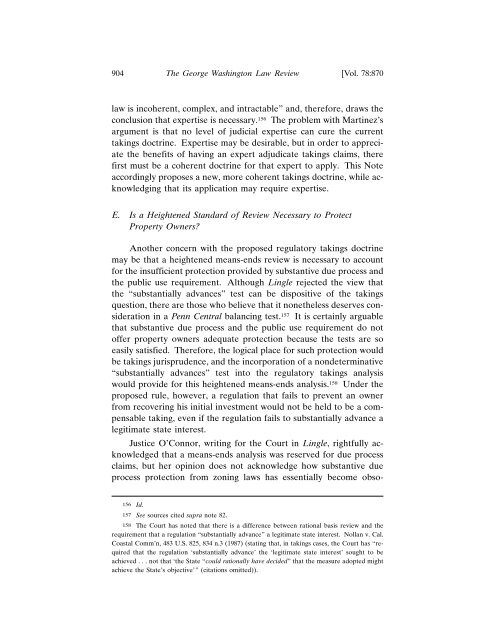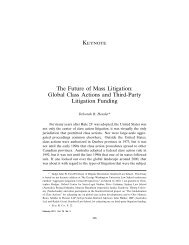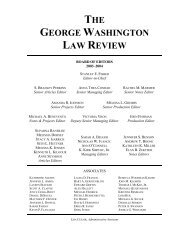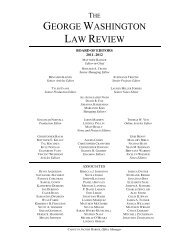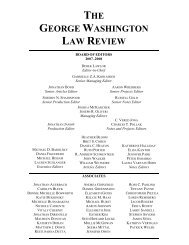View PDF - The George Washington Law Review
View PDF - The George Washington Law Review
View PDF - The George Washington Law Review
Create successful ePaper yourself
Turn your PDF publications into a flip-book with our unique Google optimized e-Paper software.
904 <strong>The</strong> <strong>George</strong> <strong>Washington</strong> <strong>Law</strong> <strong>Review</strong> [Vol. 78:870<br />
law is incoherent, complex, and intractable” and, therefore, draws the<br />
conclusion that expertise is necessary. 156 <strong>The</strong> problem with Martinez’s<br />
argument is that no level of judicial expertise can cure the current<br />
takings doctrine. Expertise may be desirable, but in order to appreciate<br />
the benefits of having an expert adjudicate takings claims, there<br />
first must be a coherent doctrine for that expert to apply. This Note<br />
accordingly proposes a new, more coherent takings doctrine, while acknowledging<br />
that its application may require expertise.<br />
E. Is a Heightened Standard of <strong>Review</strong> Necessary to Protect<br />
Property Owners?<br />
Another concern with the proposed regulatory takings doctrine<br />
may be that a heightened means-ends review is necessary to account<br />
for the insufficient protection provided by substantive due process and<br />
the public use requirement. Although Lingle rejected the view that<br />
the “substantially advances” test can be dispositive of the takings<br />
question, there are those who believe that it nonetheless deserves consideration<br />
in a Penn Central balancing test. 157 It is certainly arguable<br />
that substantive due process and the public use requirement do not<br />
offer property owners adequate protection because the tests are so<br />
easily satisfied. <strong>The</strong>refore, the logical place for such protection would<br />
be takings jurisprudence, and the incorporation of a nondeterminative<br />
“substantially advances” test into the regulatory takings analysis<br />
would provide for this heightened means-ends analysis. 158 Under the<br />
proposed rule, however, a regulation that fails to prevent an owner<br />
from recovering his initial investment would not be held to be a compensable<br />
taking, even if the regulation fails to substantially advance a<br />
legitimate state interest.<br />
Justice O’Connor, writing for the Court in Lingle, rightfully acknowledged<br />
that a means-ends analysis was reserved for due process<br />
claims, but her opinion does not acknowledge how substantive due<br />
process protection from zoning laws has essentially become obso-<br />
156 Id.<br />
157 See sources cited supra note 82.<br />
158 <strong>The</strong> Court has noted that there is a difference between rational basis review and the<br />
requirement that a regulation “substantially advance” a legitimate state interest. Nollan v. Cal.<br />
Coastal Comm’n, 483 U.S. 825, 834 n.3 (1987) (stating that, in takings cases, the Court has “required<br />
that the regulation ‘substantially advance’ the ‘legitimate state interest’ sought to be<br />
achieved . . . not that ‘the State “could rationally have decided” that the measure adopted might<br />
achieve the State’s objective’” (citations omitted)).


